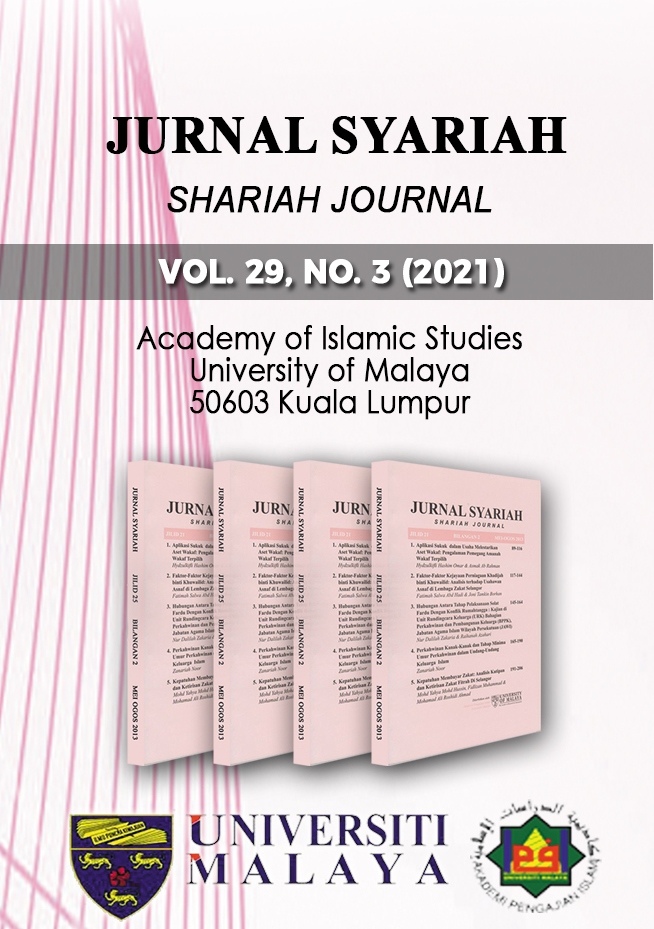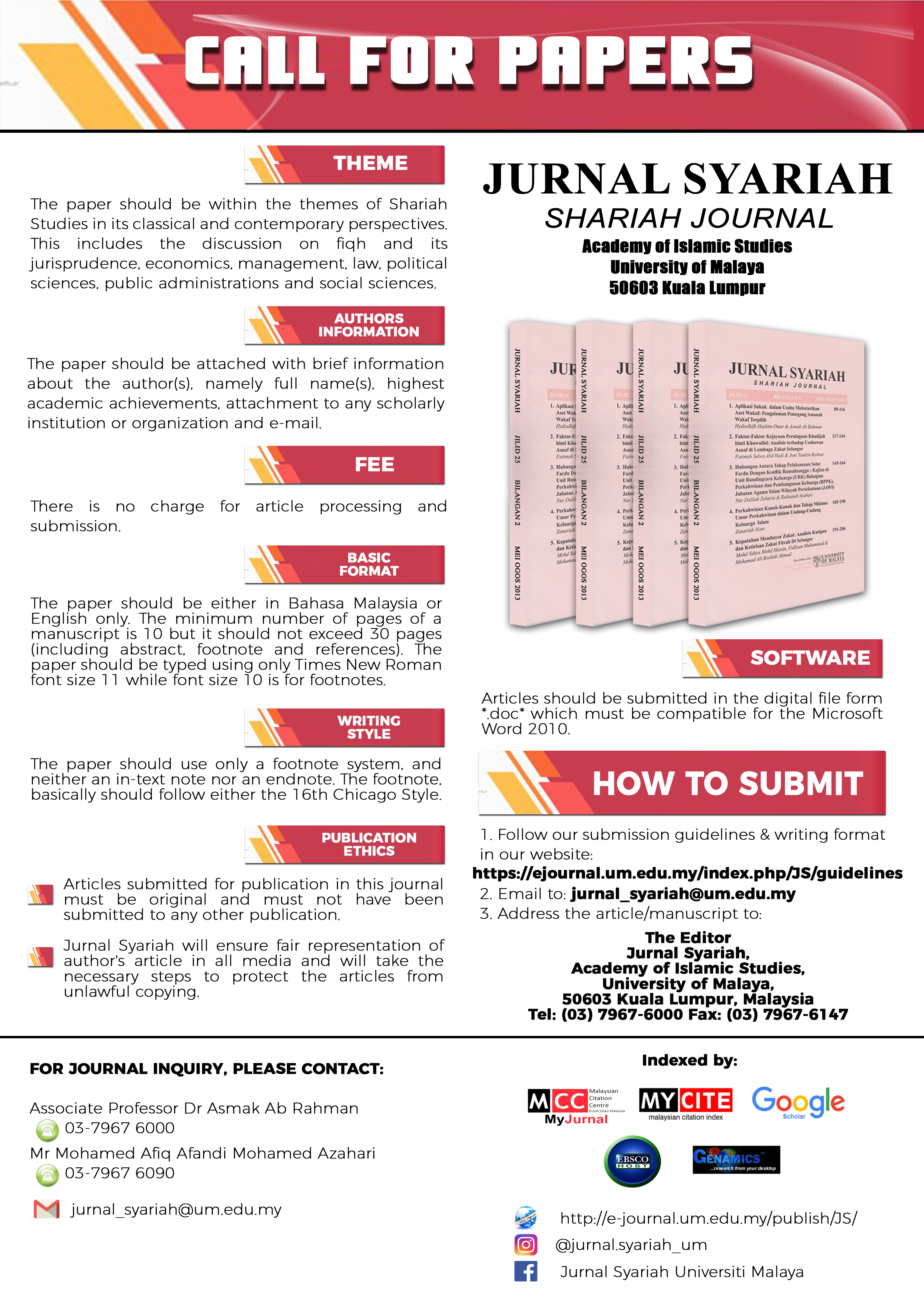PERSEPSI PENGGUNA TERHADAP KEMPEN BUY MUSLIM FIRST (‘BMF’), LOGO HALAL DAN LOGO ZAKAT PERNIAGAAN: KAJIAN DI SELANGOR
Consumers’ Perception towards Buy Muslim First (‘BMF’) Campaign, Halal Logo and Corporate Zakah Logo: A Study in Selangor
DOI:
https://doi.org/10.22452/syariah.vol29no3.5Keywords:
Muslim entrepreneurs, corporate zakat payment, Buy Muslim First, corporate social responsibility, Halal LogoAbstract
Corporate zakah collection in Selangor is still low compared to income zakah collection, although the amount of zakah collection has increased from year to year in tandem with the increase of Muslim entrepreneurs in Selangor. Situations like this affect the distribution of zakah by the Lembaga Zakat Selangor (LZS) as a whole, therefore causing some asnaf to not receive their distribution. The question posed here is whether the implementation of the Buy Muslim First (BMF) campaign, as well as the creation of awards in the form of certain logos to Muslim entrepreneurs who pay corporate zakah consistently can overcome this issue. This study aims to measure consumers’ perception of the BMF campaign as their perspective can in turn affect Muslim entrepreneurial companies as well as the Islamic economy. The analysis was done by testing several factors including price, income, the halal logo by JAKIM, halal logo(s) besides JAKIM’s logo, the business zakah logo and corporate social responsibility (CSR) factors. This study was conducted by distributing online questionnaire forms randomly (online survey) to 207 consumers in the Gombak and Hulu Langat districts of Selangor. Positive feedback was received on both the implementation of the BMF campaign and also the idea of creating a business zakah logo. The results show that consumers are interested in prioritising Muslim products and agreed that the BMF campaign should be implemented and continued in Malaysia. This perception will affect the spirit of Muslim entrepreneurs who want to open and grow their businesses. The study also found that the business zakah logo variable and the existing company CSR variable were significantly related.
Downloads
References
Adibah Abdul Wahab & Joni Tamkin Borhan, ‘Faktor Penentu Pembayaran Zakat Oleh Entiti Perniagaan di Malaysia: Satu Tinjauan Teori,’ Jurnal Syariah, vol. 22/3 (2014): 295-322.
Anas, M. Y., Wan Mohd Yusof, W. C., & Mahani, M., ‘The Concept of Halalan Tayyiba and Its Application in Products Marketing: A Case Study at Sabasun HyperRuncit Kuala Terengganu, Malaysia,’ International Journal of Business and Social Science, vol. 1/3 (2010): 239-248.
Aslina Abu Bakar, Kesedaran membayar zakat perniagaan masih rendah-MAIDAM, Berita Harian online, https://www.bharian.com.my/taxonomy/term/2645/2016/06/163562/kesedaran-bayar-zakat-perniagaan -masih-rendah-maidam, diakses 23 Ogos 2021.
Bahril B. Balli & Wahid Razzaly, ‘Instrumen Penilaian Bagi Pengiktirafan Pengalaman Pembelajaran Terdahulu (PPPT) dalam Konteks Pembelajaran Sepanjang Hayat: Transformasi Pendidikan Politeknik di Malaysia. Persidangan Kebangsaan Penyelidikan dan Inovasi dalam Pendidikan dan Latihan Teknik dan Vokasional (CIETVT) 2011. Anjuran Politeknik Seberang Perai, Pulau Pinang.
Bahtiar Mohamad, Hassan Abu Bakar & Nik Adzrieman ‘Relationship Between Corporate Identity and Corporate Reputation: A Case of a Malaysian Higher Education Sector,’ Jurnal Manajemen Pemasaran vol. 2/2 (2007): 81-89.
Eman Mohamed Abd-El-Salam, Ayman Yehia Shawky & Tawfik El-Nahas ‘The Impact of Corporate Image and Reputation on Service Quality, Customer Satisfaction and Customer Loyalty: Testing the Mediating Role. Case Analysis in an International Service Company,’ Journal of Business and Retail Management Research (JBRMR), vol. 8/1 (2013): 130-153.
Faezy Adenan, Siti Amirah Abd Rahghni, Hairunnizam Wahid & Sanep Ahmad, ‘Cadangan Mewujudkan Logo Kepatuhan Zakat Perniagaan: Kajian Terhadap Usahawan Muslim di Selangor,’ Jurnal Pengurusan dan Penyelidikan Fatwa, vol. 10/1 (2017): 16-36.
Gujarati, D.N., Basic Econometrics, 4th Edition (New York: McGraw Hill, 2003).
Hairunnizam Wahid, Abdul Halim Abu Bakar & Sanep Ahmad ‘Hubungan Antara Imej Korporat Usahawan Muslim dan Pembayaran Zakat Perniagaan di Daerah Sepang Selangor,’ Jurnal Syariah, vol. 24/1 (2016): 1-24.
Jabatan Perangkaan Malaysia, Laporan Survei Pendapatan Isi Rumah dan Kemudahan Asas Mengikut Negeri dan Daerah Pentadbiran Selangor 2019. (Putrajaya: Jabatan Perangkaan Malaysia, 2019).
Kamus Dewan Bahasa dan Pustaka, https://prpm.dbp.gov.my/Cari1?keyword=logo&d=176312LIHATSINI. diakses pada 6 Januari 2021.
Khairil Anwar Mohd Amin, ‘Kempen BMF tingkat jualan peniaga Islam tiga kali ganda’ Sinar Harian online,
https://www.sinarharian.com.my/article/47663/BERITA/Nasional/Kempen-BMF-tingkat-jualan-peniaga-Islam-tiga-kali-ganda. Diakses 9 Julai 2020.
Lembaga Zakat Selangor. Info Kutipan dan Agihan Lembaga Zakat Selangor, Portal LZS https://www.zakatselangor.com.my/informasi/laporan-aktiviti-zakat/, diakses 10 Julai 2020.
Mohammad Aizat Jamaludin, Mohd Anuar Ramli, Suhaimi Ab Rahman ‘Ijtihad Kontemporari Dalam Pembinaan Fiqh Kepenggunaan Semasa di Malaysia’ International Conference on Creativity and Innovation for Sustainable Development Infusing Creativity and Innovation in Education 2011.
Mohd Rafiq Abdul Rahim, ‘The Relationship Between Corporate Social Responsibility (CSR) and Malaysia Halal Industry,’ Journal of Islamic Social Sciences and Humanities. vol.23/1 (2020): 15-25.
Mustafa Karadeniz, ‘The Importance of Creating a Successful Corporate Identity and Corporate Image for Enterprise in Marketing Management,’ Journal of Naval Science and Engineering, vol.5/3 (2009): 1-15.
Norlaila Mazura Hj. Mohaiyadin, Mohamad Ishak Mohamad Ibrahim, Izzatul Ussna Ridzwan & Mohd Rizuan Abdul Kadir, ‘Challenges in Zakah Collection: In Case of Business Zakah Payers in Selangor,’ The European Proceedings of Social & Behavioural Sciences (Future Academy www.FutureAcademy.org.UK, 2017), 31-37.
Nurul Zubaidah Mustaffa, Sarah Aqilah Mazuki, Sharifah Musfirah Tuan Azmi, Wan Nor Naimah Husna Wan Mansor, Wan Nur Syahirah Wan Yusof & Wan Mohd Yusof Wan Chik, ‘Kempen “Buy Muslim First”: Analisis Menurut Maqasid Shariah,’ Proceedings of the International Conference on Islamic Civilization and Technology Management. Kuala Terengganu: INSPIRE (2019), 229-244.
Nurulhuda Noordin, Nor Laila Md Noor, Mardziah Hashim & Zainal Samicho, ‘Value Chain of Halal Certification System: A Case of The Malaysian Halal Industry,’ European and Mediterranean Conference on Information Systems 2009 (July 13-14 2009, Crowne Plaza Hotel, Izmir).
Portal Rasmi Pejabat Tanah Daerah Hulu Langat, ‘Taburan Bangsa mengikut PBT,’ https://www.selangor.gov.my/hululangat.php/pages/view/22?mid=48, diakses 23 Ogos 2021.
Siti Amirah Abd Rahghni, Faezy Adenan, Hairunnizam Wahid & Sanep Ahmad, ‘Cadangan Mewujudkan Logo Kepatuhan Zakat Perniagaan: Kajian Usahawan Muslim di Selangor,’ Proceedings of Conference on Malaysian Islamic Economics and Finance 2015 (Bangi: Ekonis-UKM, 2015), 171-186.
Siti Hasnah Hassan, Norizan Mat Saad, Tajul Ariffin Masron & Siti Insyirah Ali, ‘Buy Muslim-Made First – Does Halal Consciousness Affect Muslims’ Intention to Purchase?’ Journal of Islamic Marketing, vol. 13/2 (2020): 466-480
Yazilmiwati@Hasni Yaacob, ‘Kajian Faktor Kejayaan dan Pencapaian Usahawan Muslim di Malaysia’ (Tesis PhD. Akademi Pengajian Islam Universiti Malaya, 2016).
Downloads
Published
How to Cite
Issue
Section
License

This work is licensed under a Creative Commons Attribution-NonCommercial 4.0 International License.
COPYRIGHT: All rights reserved. Not allowed to be reproduced any part of articles and contents of this journal in any form or by any way, whether electronic, mechanical, photocopying, recording or otherwise without permission in writing from the Chief Editor, Jurnal Syariah.



















